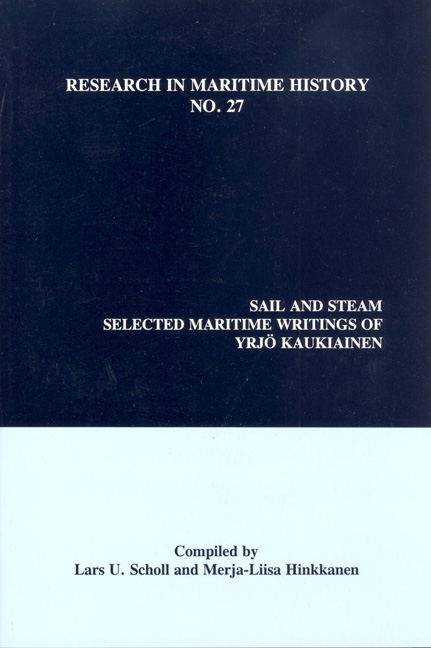Book contents
- Frontmatter
- Frontispiece
- Table of Contents
- Acknowledgements
- “Yrjö Kaukiainen: A Tribute on the Occasion of his Forthcoming Retirement as Professor of Maritime History at the University of Helsinki”
- “Yrjö Kaukiainen: A Man of the Sea”
- “Yrjö Kaukiainen and the Development of Maritime Economic History”
- “Finnish Sailors, 1750-1870”
- “Finnish and International Maritime Labour in the Age of Sail: Was There a Market?”
- “Five Years before the Mast: Observations on the Conditions of Maritime Labour in Finland and Elsewhere”
- “The Maritime Labour Market: Skill and Experience as Factors of Demand and Supply”
- “Owners and Masters: Management and Managerial Skills in the Finnish Ocean-Going Merchant Fleet, c. 1840-1880”
- “From Low-Cost to High-Cost Shipping: Finnish Maritime Labour Costs after the Second World War”
- “The Modernization of Finnish Coastal Shipping and Railway Competition c. 1830-1913”
- “British Timber Imports and Finnish Shipping 1860-1910”
- “Baltic Timber-Trade under Sail: An Example of the Persistence of Old Techniques”
- “Coal and Canvas: Aspects of the Competition between Steam and Sail, c. 1870-1914”
- “Dutch Shipping and the Swedish Navigation Act (1724). A Case Study”
- “Seamen Ashore: Port Visits of Late Nineteenth-Century Finnish Sailors”
- “Wreck-plundering by East Finnish Coastal People - Criminal Tradition or Popular Culture?”
- “From Days and Knots to Pounds and Dollars: Some Problems in the Study of the Economics of Late Nineteenth Century Merchant Shipping”
- “Tons and Tonnages: Ship Measurement and Shipping Statistics, c. 1870-1980”
- “International Freight Markets in the 1830s and 1840s: The Experience of a Major Finnish Shipowner”
- “Shrinking the World: Improvements in the Speed of Information Transmission, c. 1820-1870”
- “Yrjö Kaukiainen: A Maritime Bibliography”
“The Maritime Labour Market: Skill and Experience as Factors of Demand and Supply”
- Frontmatter
- Frontispiece
- Table of Contents
- Acknowledgements
- “Yrjö Kaukiainen: A Tribute on the Occasion of his Forthcoming Retirement as Professor of Maritime History at the University of Helsinki”
- “Yrjö Kaukiainen: A Man of the Sea”
- “Yrjö Kaukiainen and the Development of Maritime Economic History”
- “Finnish Sailors, 1750-1870”
- “Finnish and International Maritime Labour in the Age of Sail: Was There a Market?”
- “Five Years before the Mast: Observations on the Conditions of Maritime Labour in Finland and Elsewhere”
- “The Maritime Labour Market: Skill and Experience as Factors of Demand and Supply”
- “Owners and Masters: Management and Managerial Skills in the Finnish Ocean-Going Merchant Fleet, c. 1840-1880”
- “From Low-Cost to High-Cost Shipping: Finnish Maritime Labour Costs after the Second World War”
- “The Modernization of Finnish Coastal Shipping and Railway Competition c. 1830-1913”
- “British Timber Imports and Finnish Shipping 1860-1910”
- “Baltic Timber-Trade under Sail: An Example of the Persistence of Old Techniques”
- “Coal and Canvas: Aspects of the Competition between Steam and Sail, c. 1870-1914”
- “Dutch Shipping and the Swedish Navigation Act (1724). A Case Study”
- “Seamen Ashore: Port Visits of Late Nineteenth-Century Finnish Sailors”
- “Wreck-plundering by East Finnish Coastal People - Criminal Tradition or Popular Culture?”
- “From Days and Knots to Pounds and Dollars: Some Problems in the Study of the Economics of Late Nineteenth Century Merchant Shipping”
- “Tons and Tonnages: Ship Measurement and Shipping Statistics, c. 1870-1980”
- “International Freight Markets in the 1830s and 1840s: The Experience of a Major Finnish Shipowner”
- “Shrinking the World: Improvements in the Speed of Information Transmission, c. 1820-1870”
- “Yrjö Kaukiainen: A Maritime Bibliography”
Summary
One standard character in the gallery of maritime literature is the “Old Tar,” “Ancient Mariner,” “Old Salt,” or whatever he is called. As the names denote, he was an elderly sailor with long experience sailing the seven seas. He was the epitome of a long accumulation of maritime skills, a symbol of the special expertise required by deep-sea sailors which made his profession much more demanding than typical landward occupations.
This is not just a romantic perception but one that also has been shared by many serious historians. Thus, for example, Basil Greenhill wrote in a recent article that seamanship “was perhaps the most complex and demanding pattern of skills ever acquired by ordinary men.” And he also emphasizes the importance of training by reminding us of Rudyard Kipling's description in Captains courageous of how Long Jack, at the first possible moment, taught young Harvey Cheyne “things at the sea that every man must know, blind, drunk, or asleep.”
The idea that sailors were very special people is by no means surprising. Intuitively, all of us admit that life aboard old sailing vessels must have been hard and demanding and that everyone who did well in such a profession developed a special “pattern of skills.” This was, in fact, what even the sailors themselves wanted to demonstrate. Both in outward looks and behaviour they reflected their specialty, and the contempt they expressed towards landlubbers, “greenhorns” and farm hands (“with hay-seed in their hair”) implicitly also conveyed the idea of a profession that required the very best of men.
Yet maritime literature also abounds with very different characters. The popular image of ordinary seaman, “Jack Tar,” exhibits no pretensions either for advanced age or exceptional skills and experience - rather Jack was the epitome of a merry fellow who had a girl in each port and drank his earnings in a matter of few weeks. And an even starker picture of the professional (as well as moral) levels of sailors can be found in such realistic descriptions as Herman Melville's Redburn or Jack London's Mutiny on board of the Elsinore.
- Type
- Chapter
- Information
- Sail and SteamSelected Maritime Writings of Yrjö Kaukiainen, pp. 45 - 52Publisher: Liverpool University PressPrint publication year: 2004

